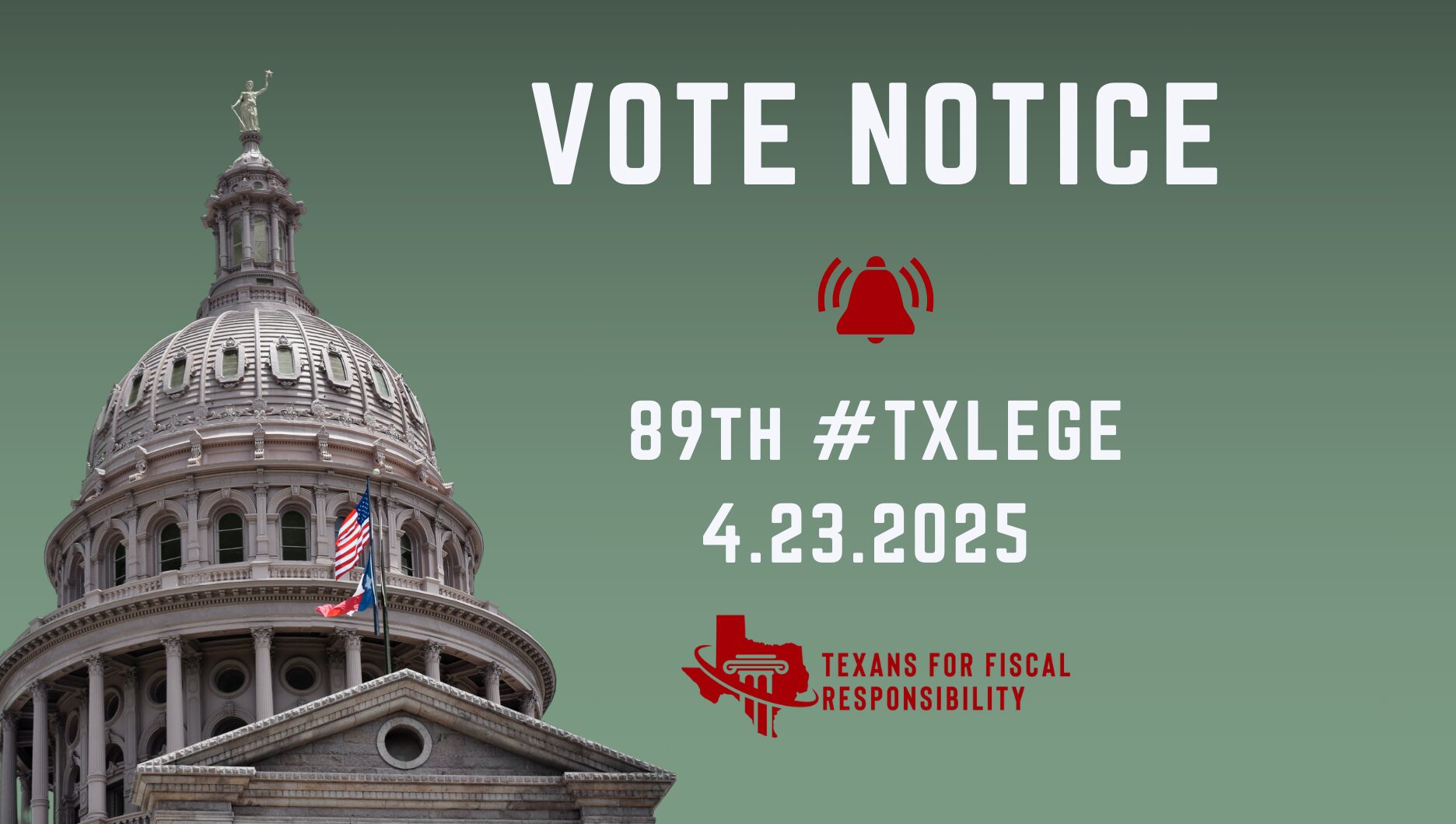
Texans for Fiscal Responsibility has issued the following vote notice for April 23rd, 2025
Texas House of Representatives
Subject: Senate Bill 5 (SB 5) – Creating Dementia Research Institute
- Author: State Sen. Joan Huffman (R-Houston)
- Caption: Relating to the creation of the Dementia Prevention and Research Institute of Texas.
- TFR Position: OPPOSE
- Background:
- SB 5 establishes the Dementia Prevention and Research Institute of Texas, a state-funded entity tasked with awarding grants for dementia research and prevention. The institute will be overseen by an appointed committee and funded through legislative appropriations, federal grants, and private donations. While addressing dementia is important, this bill expands government involvement in medical research, which is best left to the private sector. SB 5 represents inappropriate government spending, creates long-term financial obligations, and risks bureaucratic inefficiencies, making it an improper use of taxpayer dollars and improper government intervention. For these reasons, TFR opposes SB 5.
Subject: Senate Joint Resolution 3 (SJR 3) – Constitutional Amendment for the Dementia Institute
- Author: State Sen. Joan Huffman (R-Houston)
- Caption: Proposing a constitutional amendment providing for the establishment of the Dementia Prevention and Research Institute of Texas, establishing the Dementia Prevention and Research Fund to provide money for research on and prevention and treatment of dementia and related disorders in this state, and transferring to that fund $3 billion from state general revenue.
- TFR Position: OPPOSE
- Background:
- SJR 3 is the constitutional amendment for SB 5, creates the Dementia Prevention and Research Fund, and appropriates $3 billion from general revenue to the fund for 2026. This is an inappropriate use of taxpayer dollars. For these reasons, TFR opposes SJR 3.
Subject: House Joint Resolution 72 (HJR 72) – Tax Exemption for IDD Housing
- Author: State Rep. Candy Noble (R-Lucas)
- Caption: Proposing a constitutional amendment authorizing the legislature to provide for an exemption from ad valorem taxation of a portion of the market value of a property that is the primary residence of an adult who has an intellectual or developmental disability and who must be related to the owner or trustee of the property within a certain degree by consanguinity.
- TFR Position: SUPPORT
- Background:
- HJR 72 offers a targeted property tax exemption for families who provide housing for adult relatives with intellectual or developmental disabilities. It empowers families—rather than the state—to care for their loved ones by reducing the tax burden on homes used for this purpose. By enabling relatives to maintain ownership of the home without jeopardizing federal benefits for the individual with a disability, this amendment helps keep vulnerable Texans in stable, family-supported environments. The exemption is narrowly tailored, avoiding creating a broad entitlement and instead focuses relief where there is a demonstrated need, with no significant cost to taxpayers.
Subject: House Bill 2669 (HB 2669) – Cow deaths from balloons
- Author: State Rep. R.D. Guerra (D-Mission)
- Caption: Relating to the establishment of a reporting and education program for the dangers of balloons to livestock.
- TFR Position: OPPOSE
- Background:
- HB 2669 directs Texas A&M AgriLife to build a new bureaucracy to track and report livestock deaths tied to balloon litter. While the concern for ranchers is understandable, the bill creates a government-managed system based on anecdotal incidents without clear data showing a widespread issue. It imposes new responsibilities on a public university system and it authorizes educational campaigns that may result in potential future regulations. This bill sets the stage for unnecessary expansion of government programs under the guise of protecting livestock. The bill risks wasting taxpayer money on reports and outreach with no clear return. From a limited government perspective, this bill creates obligations better handled by local efforts or the private sector.
Subject: House Bill 391 (HB 391) – Local meeting access requirement
- Author: State Rep. Keith Bell (R-Forney)
- Caption: Relating to board of directors meeting locations of certain special districts.
- TFR Position: SUPPORT
- Background:
- HB 391 ensures that residents in special-purpose water districts, especially those in fast-growing areas, have better access to board meetings and tax hearings. It removes outdated restrictions that previously limited transparency by allowing districts to hold meetings far from their residents. Under this bill, these meetings must either occur within a reasonable distance or be made accessible online—with safeguards to maintain public access. The bill helps to enhance local oversight, reduce the burden of travel for public participation, and ensure that residents can hold taxing entities accountable.
Subject: House Bill 517 (HB 517) – Limits POA drought penalties
- Author: State Rep. Caroline Harris (R-Round Rock)
- Caption: Relating to the authority of a property owners’ association to assess a fine for discolored vegetation or turf during a period of residential watering restriction.
- TFR Position: SUPPORT
- Background:
- HB 517 protects Texas homeowners from being unfairly fined by their property owners’ associations (POAs) during times of city-mandated water restrictions. It prevents POAs from enforcing lawn appearance rules that require green grass or ban brown turf when water use is limited due to drought. The bill also grants homeowners a 30-day grace period after the restriction ends to bring their lawn back into compliance. This measure ensures that residents are not put in the unreasonable position of choosing between obeying city water rules or facing HOA penalties. The bill reduces unnecessary penalties, upholds personal property rights, and limits the overreach of unelected POA boards.
Subject: House Bill 1716 (HB 1716) – Expands Medicaid mental health coverage
- Author: State Rep. Drew Darby (R-San Angelo)
- Caption: Relating to the provision of counseling services by certain providers under Medicaid and reimbursement for those services.
- TFR Position: OPPOSE
- Background:
- HB 1716 mandates taxpayer-funded Medicaid reimbursement for services provided by associate-level mental health professionals who are not yet fully licensed. This bill effectively lowers the professional threshold for reimbursable care and increases costs without meaningful safeguards. It obligates the state to pay for care from trainees at rates that could add up significantly across thousands of service hours. Medicaid is already a ballooning budget item, and this bill invites further expansion. The bill also opens the door for liberal interpretations of eligibility and scope, creating potential for further budget creep. With a looming cap of 3,000 reimbursable hours per provider, the long-term fiscal burden could become substantial. Instead of subsidizing more government-dependent healthcare, lawmakers should focus on reforming Medicaid to reduce dependency and encourage market-driven solutions.
Subject: House Bill 1866 (HB 1866) – Expands federal police powers
- Author: State Rep. John Lujan (R-San Antonio)
- Caption: Relating to the state law enforcement authority of federal National Park Service law enforcement officers.
- TFR Position: OPPOSE
- Background:
- HB 1866 expands the legal authority of National Park Service officers in Texas, allowing them to carry out state-issued arrest and search warrants and act under state mental health provisions. While this may sound practical, it erodes Texas’s principle of maintaining local control by handing state law enforcement responsibilities to federal employees. Taxpayers already fund local police and sheriffs. It opens the door for federal officers to act with state authority, potentially without the same local accountability. Empowering federal agencies to do state-level policing diminishes state sovereignty and could lead to future federal overreach. Public safety should be addressed by reinforcing local law enforcement and coordination efforts—not expanding the powers of Washington’s agents at national parks across the state.
Subject: House Bill 3707 (HB 3707) – Crackdown on oil theft
- Author: State Rep. Tom Craddick (R-Midland)
- Caption: Relating to the inspection, purchase, sale, possession, storage, transportation, and disposal of petroleum products, oil and gas equipment, and oil and gas waste; creating criminal offenses and increasing the punishment for an existing criminal offense.
- TFR Position: SUPPORT
- Background:
- HB 3707, the companion to SB 1806, strengthens property rights and market integrity in Texas’s energy sector by increasing penalties for stealing or illegally handling petroleum products and oilfield equipment. It gives law enforcement tools to inspect petroleum shipments, seize stolen product, and recover its value without the need for prolonged storage or legal delays. Officers trained under new guidelines can test samples and coordinate sales through private contractors, avoiding unnecessary government buildup. The bill also targets unauthorized drilling or use of disposal wells, reinforcing existing regulatory requirements with clearly defined criminal penalties. Rather than creating new bureaucracies, it sharpens enforcement of current law and protects legitimate businesses from bad actors, promoting private property rights.
Subject: House Bill 503 (HB 503) – Rural law enforcement salary grant funds
- Author: State Rep. Carl Tepper (R-Lubbock)
- Caption: Relating to the eligibility of certain counties to participate in the rural sheriff’s office salary assistance grant program and the rural prosecutor’s office salary assistance grant program.
- TFR Position: OPPOSE
- Background:
- HB 503 would expand eligibility for taxpayer-funded salary grants to sheriffs’ and prosecutors’ offices in counties with up to 400,000 residents, shifting the original focus away from truly rural areas. While sold as helping law enforcement, this bill actually broadens government subsidies to larger, more urban counties. The expansion would create an indeterminate and potentially significant cost to taxpayers. It would also dilute the intended purpose of rural grants by subsidizing counties that are already better-resourced than smaller rural areas. From a limited government perspective, HB 503 represents unnecessary mission creep and expansion of state spending. Rather than focusing limited funds on the truly rural counties most in need, it spreads taxpayer dollars more thinly with little accountability. HB 503 is another example of government programs growing beyond their original intent.
Subject: House Bill 1089 (HB 1089) – Creates Gulf Coast project fund
- Author: State Rep. Dennis Paul (R-Houston)
- Caption: Relating to creation of the gulf coast protection account to be administered by the General Land Office.
- TFR Position: OPPOSE
- Background:
- HB 1089 establishes a dedicated state fund to support federally-linked coastal infrastructure projects administered by the Texas General Land Office. This bill sets up an ongoing mechanism to funnel state dollars—without clear limits or sunset provisions—toward large-scale, federally tied projects. It risks creating a taxpayer-backed funding pipeline with little legislative oversight beyond initial appropriation. This centralized fund may encourage bureaucratic expansion, as it locks the state into long-term commitments aligned with federal engineering priorities. From a fiscally conservative standpoint, the bill enables government growth by dedicating public resources for vague “useful” projects with limited transparency on cost-effectiveness. Taxpayers are left underwriting obligations that may not deliver direct or measurable returns to them. The bill lacks sufficient guardrails to ensure funds aren’t misused or diverted to low-priority projects.
Subject: House Bill 972 (HB 972) – Tax Exemption for IDD Housing
- Author: State Rep. Candy Noble (R-Lucas)
- Caption: Relating to an exemption from ad valorem taxation of a portion of the appraised value of a property other than a residence homestead that is the primary residence of an adult who has an intellectual or developmental disability and who must be related to the owner or trustee of the property within a certain degree by consanguinity.
- TFR Position: SUPPORT
- Background:
- HB 972 is the enabling legislation for HJR 72. It offers a targeted property tax exemption for families who provide housing for adult relatives with intellectual or developmental disabilities. It empowers families—rather than the state—to care for their loved ones by reducing the tax burden on homes used for this purpose. By enabling relatives to maintain ownership of the home without jeopardizing federal benefits for the individual with a disability, this amendment helps keep vulnerable Texans in stable, family-supported environments. The exemption is narrowly tailored, avoiding creating a broad entitlement and instead focuses relief where there is a demonstrated need, with no significant cost to taxpayers.
Texas Senate
Subject: Senate Joint Resolution 85 (SJR 85) – Increased exemptions at taxpayer expense
- Author: State Sen. Paul Bettencourt (R-Houston)
- Caption:
- TFR Position: OPPOSE
- Background:
- SJR 85 proposes a constitutional amendment aiming to provide property tax relief by increasing the school district exemption for elderly and disabled homeowners from $10,000 to $60,000. The intent is completely understandable—some older and disabled Texans live on fixed incomes and face increasing costs of living. However, while the goal may be very much well intentioned, the approach falls short of meaningful reform. Instead of lowering taxes for all Texans, this bill carves out relief for a subset of the population, pushing the cost onto other taxpayers. Taxpayers would bear more than $1.2 billion in additional costs over the next biennium alone, with no corresponding decrease in overall government size or spending. School districts are held harmless for their lost revenue through automatic state backfills, creating a permanent financial obligation funded by general revenues—meaning other taxpayers, including younger families, renters, and small businesses, will pick up the tab. This is not comprehensive tax relief; it’s tax shifting that does not deliver broad-based, structural reforms or reductions in property tax burdens, and makes future reform more difficult.
- A better approach would be to freeze school district M&O property taxes, and use surplus revenue to compress school M&O property taxes until eliminated for everyone, including elderly and disabled Texans. Employing fiscal discipline at the State level would enable the elimination of school M&O property taxes in just a few bienniums.
Subject: Senate Bill 23 (SB 23) – Increased exemptions at taxpayer expense
- Author: State Sen. Paul Bettencourt (R-Houston)
- Caption: Relating to an increase in the amount of the exemption from ad valorem taxation by a school district of the appraised value of the residence homestead of a person who is elderly or disabled and the protection of school districts against certain losses in local revenue.
- TFR Position: OPPOSE
- Background:
- SB 23 is the enabling legislation for SJR 85. aims to provide property tax relief by increasing the school district exemption for elderly and disabled homeowners from $10,000 to $60,000. The intent is completely understandable—some older and disabled Texans live on fixed incomes and face increasing costs of living. However, while the goal may be very much well intentioned, the approach falls short of meaningful reform. Instead of lowering taxes for all Texans, this bill carves out relief for a subset of the population, pushing the cost onto other taxpayers. Taxpayers would bear more than $1.2 billion in additional costs over the next biennium alone, with no corresponding decrease in overall government size or spending. School districts are held harmless for their lost revenue through automatic state backfills, creating a permanent financial obligation funded by general revenues—meaning other taxpayers, including younger families, renters, and small businesses, will pick up the tab. This is not comprehensive tax relief; it’s tax shifting that does not deliver broad-based, structural reforms or reductions in property tax burdens, and makes future reform more difficult.
- A better approach would be to freeze school district M&O property taxes, and use surplus revenue to compress school M&O property taxes until eliminated for everyone, including elderly and disabled Texans. Employing fiscal discipline at the State level would enable the elimination of school M&O property taxes in just a few bienniums.
Subject: Senate Bill 209 (SB 209) – Tech Corporate Welfare
- Author: State Sen. Royce West (D-Dallas)
- Caption: Relating to the creation of the Texas technology and innovation program.
- TFR Position: OPPOSE
- Background:
- SB 209 would establish a new state-level grant program that supplements federal funding for small business research and technology innovation. While it aims to promote economic development and job creation, it creates a permanent new bureaucracy within the Office of the Governor, requiring 6.5 new employees and additional infrastructure. The program shifts taxpayer dollars away from core services to subsidize a narrow set of private ventures that already have access to generous federal funds. The bill’s “Phase 0” grants go even further—funding companies before they receive any federal award, heightening the risk of waste or cronyism. With no cap on future appropriations, the program could expand unchecked. This bill represents government overreach into private-sector innovation.
Subject: Senate Bill 715 (SB 715) – Grid reliability standards for all
- Author: State Sen. Kevin Sparks (R-Midland)
- Caption: Relating to reliability requirements for certain electric generation facilities.
- TFR Position: SUPPORT
- Background:
- SB 715 strengthens the reliability of Texas’ electric grid by holding all existing power generators—not just new ones—accountable to performance standards, ensuring they’re ready to produce electricity when demand spikes. It encourages power producers to be better prepared, while allowing flexibility in how financial penalties are implemented, preventing sudden costs from hitting consumers. By tying reliability requirements to actual generator performance, this measure levels the playing field and enhances accountability without growing bureaucracy. It preserves market-driven incentives and shields consumers from inefficiencies.
Subject: Senate Bill 758 (SB 758) – Expands public information access
- Author: State Sen. Mayes Middleton (R-Galveston)
- Caption: Relating to the definition of a governmental body for the purposes of the public information law.
- TFR Position: SUPPORT
- Background:
- SB 758 is a transparency-focused reform that strengthens taxpayer oversight of government-adjacent organizations. The bill requires nonprofit associations made up of local governments—like city or school district groups funded by public dollars—to comply with Texas’ open records laws. These groups often influence policy and use taxpayer funds, yet currently operate in the shadows, shielded from public accountability. By treating these associations as governmental bodies under the law, SB 758 ensures that taxpayers can access their records and understand how public money is being used. This move aligns with conservative values of transparency, limited government, and fiscal responsibility. It prevents unelected entities from acting as quasi-government agencies without scrutiny.
Subject: Senate Bill 843 (SB 843) – Database for School bonds
- Author: State Sen. Lois Kolkhorst (R-Brenham)
- Caption: Relating to a Texas Education Agency database of school district bonds, taxes, and bond-related projects.
- TFR Position: SUPPORT
- Background:
- SB 843 takes an important step toward government transparency by requiring the Texas Education Agency to create a searchable, online database tracking school bond debt, related taxes, and capital projects. This move gives taxpayers better visibility into how local school districts are spending billions in borrowed funds and how these decisions impact property tax bills. It helps hold school boards accountable for bond elections and ensures that voters are not left in the dark about long-term financial obligations. By collecting the data and making it publicly accessible, the bill helps limit waste, prevent hidden tax hikes, and empower voters with facts. It also creates a standardized system for oversight, allowing citizens and lawmakers to compare spending trends across districts. It is a common sense, pro-taxpayer reforms to prevent fiscal mismanagement and provide the clarity taxpayers deserve.
Subject: Senate Bill 1183 (SB 1183) – Photo ID on EBT cards
- Author: State Sen. Brandon Creighton (R-Conroe)
- Caption: Relating to electronic benefits transfer cards used by or for recipients of benefits under certain assistance programs.
- TFR Position: SUPPORT
- Background:
- SB 1183 seeks to reduce welfare fraud by requiring that Texas EBT cards used for food and cash assistance include a photo ID, the fraud hotline number, and the website for reporting misuse. By visually identifying the authorized cardholder, this bill helps deter unauthorized use and ensures that taxpayer-funded benefits go to legitimate recipients. The bill also mandates the Health and Human Services Commission to track unusual patterns in card replacements—a known indicator of fraud. This measure adds a common-sense safeguard to protect taxpayer funds, reinforce personal responsibility, and minimize abuse. SB 1183 is a targeted step toward improving the integrity of government benefit programs.
Subject: Senate Bill 1756 (SB 1756) – Restricts local hotel project subsidies
- Author: State Sen. Brian Birdwell (R-Granbury)
- Caption: Relating to the authority of certain municipalities to use certain tax revenue for hotel and convention center projects and other qualified projects.
- TFR Position: SUPPORT
- Background:
- SB 1756 reins in local government spending by limiting municipalities to a single tax-incentivized hotel or convention center project. This closes loopholes that allowed larger cities to repeatedly finance these projects using taxpayer-backed revenue pledges. By restricting local governments to one project, the bill ensures greater legislative oversight and discourages unchecked local debt accumulation. This reform prevents ongoing taxpayer risk from multiple tax-incentivized developments, many of which benefit politically connected developers. Grandfathering existing projects protects current obligations but ensures new limits going forward. This bill is a measured step to ensure prudent fiscal stewardship of taxpayer dollars.
Subject: Senate Bill 2322 (SB 2322) – Weakens JETI accountability safeguards
- Author: State Sen. Phil King (R-Weatherford)
- Caption: Relating to the findings required to be made by the comptroller of public accounts in order to recommend for approval an application for a limitation on the taxable value of eligible property for school district maintenance and operations ad valorem tax purposes under the Texas Jobs, Energy, Technology, and Innovation Act.
- TFR Position: OPPOSE
- Background:
- SB 2322 creates a carve-out in the JETI property tax abatement program by removing the requirement that energy companies prove a need for the incentive to choose Texas over other states. This opens the door for utility companies to secure tax breaks regardless of whether they were ever seriously considering another location. As a result, it effectively turns the JETI program from a competitive economic development tool into a guaranteed giveaway for these companies. By eliminating safeguards, SB 2322 weakens fiscal accountability and increases corporate welfare from taxpayer handouts. This sets a dangerous precedent for future erosion of the already limited taxpayer protections in economic incentive programs.
Reminder: Vote Notices are provided to both Texas state lawmakers and the general public, sharing Texans for Fiscal Responsibility’s position on issues to be rated as a part of the Fiscal Responsibility Index. Notices are provided prior to votes being taken in each legislative chamber.
Disclaimer: We reserve the right to consider amendments to legislation that may be introduced without notice as a part of issues to be rated on the Fiscal Responsibility Index. We will make every effort to provide notice on amendments that are pre-filed.




